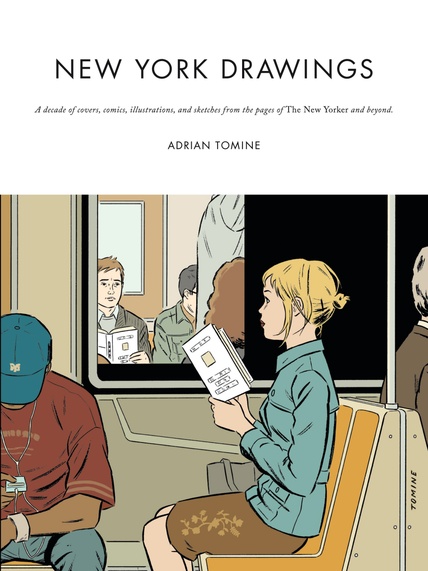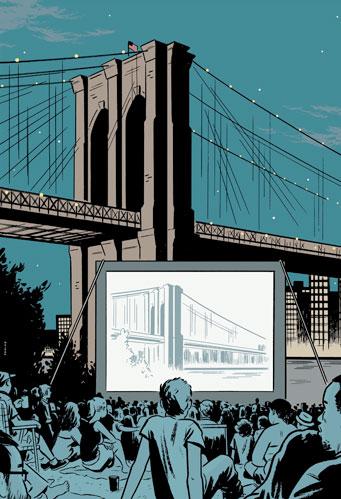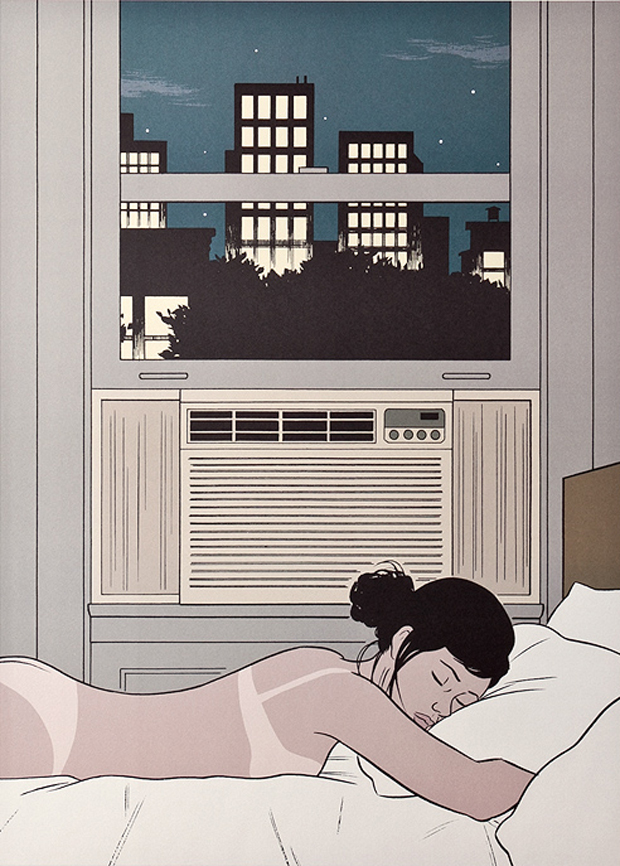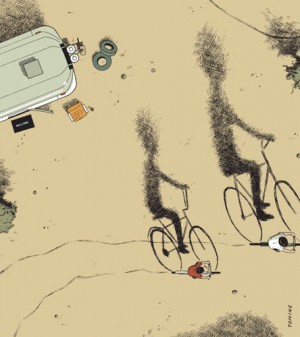You have no items in your cart. Want to get some nice things?
Go shopping
New York Drawings is a full-colour collection of illustrations and comics by American cartoonist Adrian Tomine, much of which has featured in the New Yorker. His working relationship with the magazine has produced a distinctive body of work stretching over thirteen years to the present day (see his recent, but already iconic, election week cover).
The starkly realistic, monochrome style of Tomine’s early work, inspired by Yoshihiro Tatsumi and Daniel Clowes, has slowly adapted in recent years to a full-colour, rounder aesthetic indebted to classic traditions of cartooning, first found in 2011’s instalment of Tomine’s ongoing graphic series Optic Nerve, currently published by Drawn and Quarterly. Tomine’s only graphic novel, Shortcomings (2007), tackled his own move to New York from San Francisco, but felt underwhelming when compared to the strikingly economical shorts of Optic Nerve. Equally, New York Drawings consistently evidences Tomine’s finest skill: the ability to evoke an intriguing narrative from a single, sparingly composed image, capturing the slight and fleeting moments of the everyday.
A recurring theme is the discovery of the city’s beauty in unexpected places. The introductory three-page comic depicting Tomine’s social anxiety about being at a publishing party alone gives way to fascination at the sight of an unseen aspect of the city through the bathroom window. Elsewhere, it’s the split second of eye contact between subway passengers in parallel carriages reading the same book (see left: Tomine’s first New Yorker cover), and a young girl’s wistful last glimpse of New York through the car’s rear window as her family embark on a holiday. Tomine has an uncanny knack for depicting facial expressions—eyes dart, collarbones quiver.
Tomine has expressed before how his experience of New York coincides with his experiences of marriage and parenthood, and two autobiographical comics tackle these subjects with well-judged humour. Annotated experiments and sketches in documenting the architecture of his new home appear with notes offering welcome insights into the artistic process; there’s a certain unknowable quality to many of these pieces, conjuring the bewilderment of moving. “Ash Monday” displays a woman in a geisha dress whose face is masked by a plume of grey smoke threatening to obscure half of the composition.


Two of his finest drawings in this collection share the same high-contrast pairing of blue-grey skies dotted with the faint yellow of apartment block lights. While “Double Feature” (above left) depicts an outdoor film screening beneath Brooklyn Bridge and celebrates shared experience; “A-C” (above right) portrays the loneliness of city life—a young woman lies beneath her air conditioner to soothe her sunburn, the dim glow of neighbouring buildings visible through her wide-open window, while the grid aspect of the looming architecture and the straight lines of the window sill and A-C unit below it contrast against the curvature of her supine body, which stretches across the length of the composition’s lower quarter. The subdued palette is masterfully balanced, and makes for a sensitively realised portrayal of solitude.

A number of compositions appear as disappointingly small reproductions—in particular, the pieces which accompanied New Yorker film articles; it would have been preferable to be able to fully appreciate the portrait of Orson Welles and the illustration of the 2006 drama Little Children. Thankfully, Tomine’s ethereal take on Mulholland Drive is reproduced across two pages. This composition’s choked wisps of sky, along with The God of War’s roughly cross-hatched shadows cast by two cyclists, provide a textural counterpoint to Tomine’s favoured clean-line approach. Hidden away in small print at the back of the volume are Tomine’s enlightening and humourous notes on selected pieces. It’s a shame these aren’t given more prominence.
These minor caveats aside, New York Drawings stands as a comprehensive document of a singular artist’s graduation from self-published zines to newsstands, his exploration of a sprawling, surprising city, and his mission to celebrate the minutiae of human interaction. And long may it continue.




